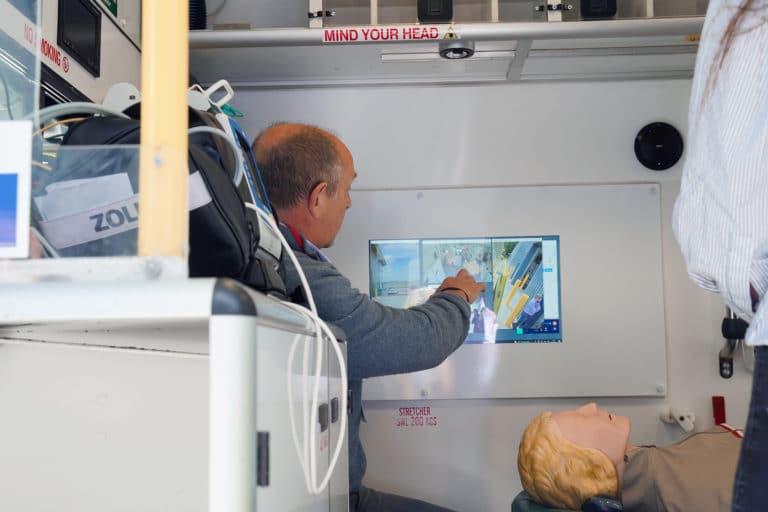To build on the discussion in an earlier roundtable in 2021, Visionable and Verizon recently asked Mike to host a follow-up roundtable of senior stakeholders from the NHS to discuss how digital and data could enable digital transformation in healthcare, and how far we are on our journey to achieving this. He shares his thoughts on the discussion and provides six takeaways for Integrated Care Systems (ICSs).
As Integrated Care Boards (ICBs) moved onto statutory footing on July 1st, we are starting to make real progress on our journey to connected and integrated health systems. Embracing the Digital era and effective use of data will be key to ensuring the success of ICSs, as well as improving service levels and lightening the load on a strained workforce. However, the NHS has historically been slow to adopt digital technology at the scale and speed necessary. There is a risk that without a new mindset and appetite for digital adoption, ICSs will continue with the status quo rather than accelerate the change in approach that is needed.
In the recent Visionable and Verizon roundtable, I was keen to understand:
- At an ICS level, what is the appetite like for embracing technology?
- How would we want to shape ICSs?
- What are leaders’ thoughts about the ICSs they work with?
As always, it was a lively and fascinating discussion with wide-ranging thoughts and ideas. Here, I have outlined the discussion to summarise leaders’ experiences, thoughts, and concerns about ICSs.
1. There is frustration that technology is not being deployed at the necessary speed and scale
There is a degree of frustration in the NHS that despite having the technology available and developed to support several of the system’s biggest challenges, it has not yet been deployed at the scale needed to have the necessary impact. Taking the example of health inequalities, in the Northeast there is a 10-year gap in life expectancy between those that live in coastal areas and everywhere else. It will be hard to deliver change and improvement in the short term without using digital ability and data to target those with greatest need.
Logically, there should not be any barriers to pulling technology through the NHS. The need is there; the system is overwhelmed and calling out for intervention. So, what will it take for the NHS to be an adopter at scale of technology?
2. Success is being seen at smaller, local levels
There are already many fantastic examples of technology adoption on a smaller, local scale. The challenge comes when scaling this up to regional or national systems. How can we effectively scale while maintaining the enthusiasm and dynamism of local communities, which is often associated with progressive primary care?
To drive innovation, we need to understand the quality outcomes for individuals and their carers. Transformation should be driven by co-production with people in each community. There cannot be national prescription that ignores local circumstances. Somehow, we need to strike a balance between ‘at scale’ and local initiative and innovation.
3. There is a plethora of funding and investment, but the challenge lies in using it to help the frontline
Interestingly, there does not seem to be concern about a lack of funding. There is a sense that there is investment, resources and plans associated with digital and technology, but it can be difficult to make its use coherent in a local strategy. Using this funding and resource to make a real difference on the frontline and with interface of patients is the challenge. How do we use this resource to leverage benefit from digital transformation of entire pathways and communities rather than having a series of disconnected point solutions?
4. ICBs must have the mindset for change – placing digital technology at the centre of planning
Are ICBs starting with the mindset to think differently or are they under so much pressure already they’re just trying to put one foot in front of the other? New ICBs leaders understand the enormity of the challenge and there is an understanding that there must be a shift in approach. Driven by the absolute crisis in the workforce that is dominating headlines and lived experiences, there is an understanding among leaders that a change is necessary.
This should be reflected in leaders imagining a future underpinned by technology, for example, building virtual wards and virtual services in future planning for elective recovery. However, there is a degree of just trying to carry on as normal. There is work currently underway to free up bed capacity, but these plans do not necessarily allow sufficiently for virtual care. For transformation to be realised, it needs to be embedded in plans. We need to be thinking differently, planning differently, and shifting mindsets.
5. ‘Virtual wards’ need designing through the eyes of the patients
The definition of ‘virtual wards’ seems to vary and there is a risk that the ambiguous language overcomplicates a simple concept. Experience from more advanced systems means that a virtual ward stands for connecting a healthcare worker to the user and bringing the system to the patient. It is about enabling a home-first approach through connection and collaboration, which digital will facilitate, with the patient at the centre.
Currently, virtual wards are about avoidance of readmission and freeing up bed capacity and are only available for specific pathways. Similarly to ICS, we must design virtual wards through the eyes of the patient. Patients need continuity of care as they move through their pathway. As we know that as it stands, moving through the system can be quite chaotic. Digital patient management and data connectivity are the key to joining up their care.
6. Digital transformation in healthcare must simultaneously tackle wider inequalities
The digital age is upon us, and the growing power of this cannot be ignored. The three biggest challenges facing our healthcare system today remain: equity, access, and digital. Using data, we must understand who is vulnerable in the communities we serve, and in turn, we must make the business case for giving every individual a computer and connection. The return on investment this will lead to means it is cheaper to do this than to not. Without connectivity, individuals seek other ways to access care, for example, they will visit their GP or A&E. Supplying smart devices and information enables individuals to feel a sense of connection and to speak virtually to a GP. Without this connectivity for all, digital transformation will not have the necessary impact at any level. We must not create a new tier of inequality but rather use technology to address unfairness.
Next steps
The success of ICSs depends on strategy, culture and assurance – and must be underpinned by technology. We can be optimistic that digital transformation in healthcare will come, largely because there is no other way. Time is always against us, but a strong plan now, that is centred around effective communication and open involvement from the perspective of the patient will make a huge difference to the NHS ability to meet its triple aim.












